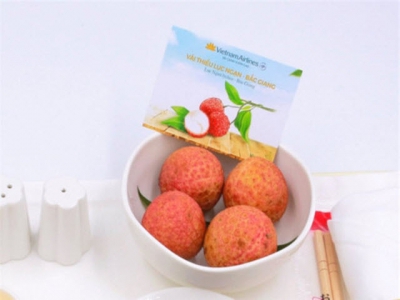Luc Ngan lychees to be served on Vietnam Airlines flights

Business class passengers on Vietnam Airlines’ domestic and international flights are to be able to enjoy Luc Ngan lychees as desert.
Photo: Vietnam Airlines
On future Vietnam Airlines’ flights, business class passengers will be able to enjoy the specialty on domestic routes between Hanoi and Ho Chi Minh City as well as on international routes departing from both Hanoi and Ho Chi Minh City.
The move aims to expand co-operation between the airline and local businesses to popularise Vietnamese agricultural products around the world.
The lychees are to be selected after undergoing a strict monitoring and quarantine process. The fruits are to be cultivated in Luc Ngan in Bac Giang province which meets standards according to Vietnamese Good Agricultural Practices (VietGAP).
Currently Luc Ngan lychees are being exported to the United States, the Republic of Korea, Japan, and Singapore.
In order to ensure the quality of the fruits served on flights, the national air carrier has tightened regulations regarding the selection and collection of fruits. Luc Ngan lychees must be picked early in the morning and then dipped into water at between two to four degrees Celsius to ensure their hygiene.
They are also preliminary processed, classified, and then stored in insulated foam containers before being transported to Noi Bai Catering Services Joint Stock Company.
The fruit are then soaked and sterilised before being put on board.
Vietnam Airlines has previously introduced numerous Vietnamese specialties such as longans from Hung Yen, oranges from Cao Phong in Hoa Binh, Tay Ninh honeydew melons, and Binh Thuan dragon fruits.
Có thể bạn quan tâm
 How Free State maize farmer survived the drought
How Free State maize farmer survived the drought Sabrina Dean visited maize farmer AC van Wyk on his farm in the Free State, to gain some insight into how an award-winning farmer tackles a difficult planting
 New Zealand holds workshop to boost Vietnam’s dragon fruit exports
New Zealand holds workshop to boost Vietnam’s dragon fruit exports The Ho Chi Minh City-based workshop last week was New Zealand’s latest effort to improve the fruit production chain in Vietnam.
 Cajuput tree trellises used to grow pepper
Cajuput tree trellises used to grow pepper Farmers in Kiên Giang Province’s Gò Quao District are using environmentally-friendly cajuput trees as trellises instead of concrete or wooden pillars